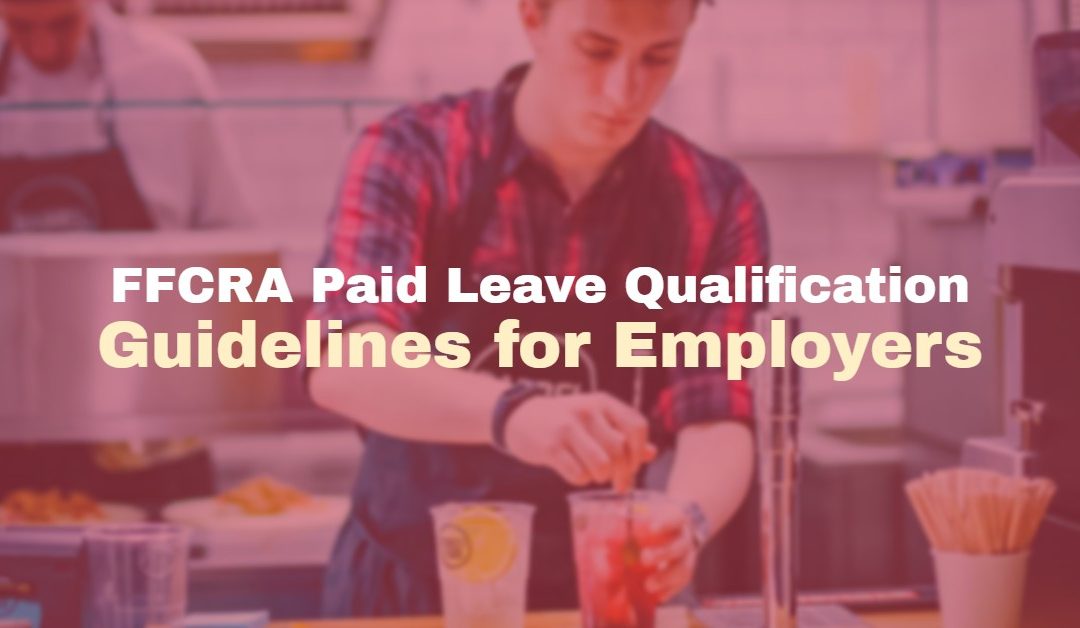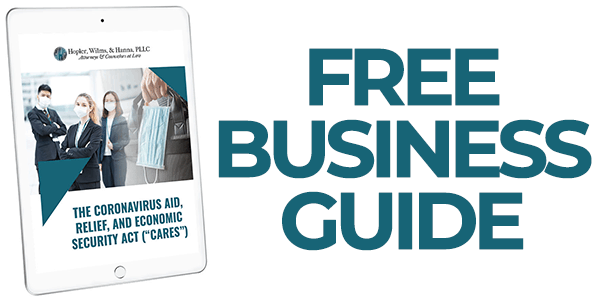On April 6, 2020, the Department of Labor gave guidelines to further clarify the changes that the Families First Coronavirus Response Act (https://www.congress.gov/bill/116th-congress/house-bill/6201 ) (FFCRA) made in expanding the Family Medical Leave Act (FMLA).
While these guidelines do not technically change anything in the bill, they do offer Employers clarification on what their obligations are under the Act. If you are totally unfamiliar with the FFCRA, we have some basic information (https://hoplerwilms.com/blog/2020/03/20/families-first-coronavirus-response-act-nc) here[/url].
Employer Notice Poster: Employee Rights: Paid Sick Leave and Expanded Family and Medical Leave under The Families First Coronavirus Response Act (FFCRA)
As an Employer, the most important change is that the Guidelines require Employers to post a notice for Employees to explain their rights. They can either be posted in a break room or similar, just like a Minimum Wage Poster. Alternatively, the Guidelines allow Employers to mail or email a copy to Employees. Copies of the poster can be obtained from the Department of Labor here. (https://www.dol.gov/agencies/whd/pandemic) Additionally, should you receive any claims from an Employee under FFCRA, you are required to retain all records from that request for 4 years, whether or not that claim was approved or denied.
Employee Qualifications Under the FFCRA
Additionally, the Guidelines clarify that an Employee only qualifies for these benefits if there is work available were they not taking leave. They further clarify that this includes teleworking options. The implications of this are two-fold. First, if an Employee’s position is no longer available (i.e. a business is shuddered because it’s been deemed non-essential or similar), then that Employee would no longer qualify for paid leave under the FFCRA, even if they had qualified previously. Second, if a teleworking arrangement would allow for the Employee to continue to perform their job duties (and the Employee is capable of teleworking), then the Employer can provide that option instead of providing leave. This second option will be particularly useful for Employers who are dealing with Employees that are immunocompromised, at-risk, or have COVID-19 and have medical orders to isolate. Finally, requests for intermittent leave only need to be granted if both the Employer and Employee agree.
Teleworking as an option is a major topic for these Guidelines and they strongly urge Employers to take steps to make this option available for Employees. In providing teleworking options, they offer clarity to both Employers and Employees on how that process should look. First, the Department of Labor has ruled that the “continuous work” requirement of the Fair Labor Standard Acts doesn’t apply. This means that Employees and Employers can work together to create a work schedule which accommodates other responsibilities the Employee may have during the day and enable the use of non-traditional business hours or days to make up for that time. To facilitate these atypical working arrangements, the Guidelines place the burden on Employees to accurately track and record their time and makes the Employer only liable to pay for hours which were properly tracked and recorded.
Applying for Leave Under the FFCRA
Employees must give reasonable notice to Employers and the application must list the Employee’s name, the dates the leave will apply, their qualifying reason, and a statement that they are unable to work or that teleworking options are not available. The qualifying reason needs to be stated with particularity. For example, if the Employee is stating the qualifying reason is because of a doctor’s order, they will need to provide the name of the health care provider that issued the order. In the case of claiming leave for childcare or another person under quarantine, the Employee will need to provide the person’s name, a statement representing that no other suitable person is available to care for that person, and, in the case of a child, the name of the school or place of care which has been closed because of COVID-19. As an Employer you would then be obligated to approve or deny the claim, including your justification for denying the claim if you deny it. Then all those records will need to be maintained by the Employer, as previously discussed, for 4 years.
We discuss the qualifying reasons at more length here (https://hoplerwilms.com/blog/2020/03/20/families-first-coronavirus-response-act-nc), but briefly, they are:
1) Employee is under isolation or quarantine order issued by a government official.
2) Employee has been advised to isolate or quarantine by a health care provider.
3) Employee is experiencing COVID-19 symptoms as is actively seeking a diagnosis.
4) Employee is caring for a person who is in isolation or quarantine as a result of government order or health care provider advice.
5) Or caring for a son or daughter whose school or place of care has been closed because of COVID-19.
Employees Qualified for FFCRA Due to Caring for Another
There is additional guidance for who would qualify for leave because they are caring for another under those last two reasons, opting in both cases for a strict reading of the rules. When caring for people who are in isolation or under quarantine, the Employee must be caring for “an immediate family member, roommate, or a similar person with whom the employee has a relationship that creates an expectation that the employee would care for the person if he or she self-quarantined or was quarantined” and that person who is being cared for must have a “genuine need” to be cared for.
Similarly, the Guidance has offered a strict interpretation of “son or daughter” under the child care qualifying reason. If there is a suitable co-parent or co-guardian available, then the Employee would not qualify for leave. Additionally, “son or daughter” has been limited to “biological, adopted, or foster child, a stepchild, a legal ward, or child of a person standing in loco parentis, who is under 18 years of age, or 18 years of age or older who is incapable of self-care due to a disability.” This means that grandparents or other family members would only qualify for leave under this reason if they are the normal, full-time guardians of the child.
Employer Exclusions: Healthcare Providers and Emergency Responders
Finally, the Department of Labor has opted to allow Employers to exclude “health care providers and emergency responders” from the leave requirements under FFCRA. And although the Department of Labor encourages Employers to be judicious in applying this exclusion, they also broadly define both “health care providers” and “emergency responders”. In doing so they have expanded this exclusion to include “other workers who are needed to keep health care facilities well supplied and operational” and “workers who are involved in the research, development, and production of […] items needed to combat the COVID-19 public health emergency.” Additionally, they have allowed each state governor to also expand this definition. While we haven’t seen it in North Carolina, some states, like Minnesota and Vermont have used this authority to extend this exclusion to grocery workers and similar.
The guidelines have given a lot of clarity on a number of issues, but there are some others which are ripe for confusion as well, such as the expanding definition of excluded Employers. For further example, an Employer cannot require an Employee to utilize their existing paid for the 2 weeks of leave under Emergency Paid Sick Leave Act (EPSLA), but can require that employee use their leave under the Emergency Family and Medical Leave Expansion Act (EFMLEA), but may be excluded under certain circumstances.
Understanding which Act applies and how those exclusions interact with the individual circumstances of the leave requested will require care and understanding of the situations.
Unfortunately, there is not a clear one-size-fits all solution here, and so we encourage our clients and other business owners to contact us with question that they have in this area so that we can give them the advice that applies to their situation.
If you need help navigating the FFCRA and what it means for your business, please schedule a call today to setup a virtual consult: (919) 244-2019


